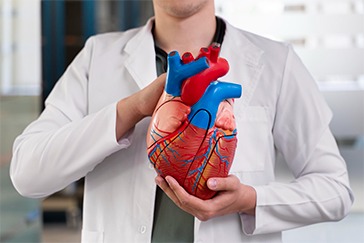 Book Appt.
Book Appt.
 Call Now
Call Now


Extracorporeal membrane oxygenation (ECMO) involves pumping blood outside of the body to a heart-lung machine. The equipment eliminates carbon dioxide and returns oxygen-rich blood to the body. Blood travels from the right side of the heart to the heart-lung machine. It is then rewarmed and returned to the body. ECMO allows blood to flow around the heart and lungs. This permits the heart and lungs to rest and recover. ECMO is a type of extracorporeal life support (ECLS). It is used to treat life-threatening cardiovascular and respiratory disorders. ECMO may treat COVID-19, acute respiratory distress syndrome (ARDS), and other infections. This blog delves into the complexities of ECMO, including uses, types, benefits, hazards, and advancements.
The ECMO machine is composed of several key components:
Why it's done
ECMO can help persons with heart or lung failure. It may also be used to treat persons who are awaiting or have already received a heart or lung transplant. It is sometimes used when other forms of life support have failed. ECMO does not treat or cure illnesses. However, it can provide temporary relief when the body is unable to produce adequate oxygen and blood flow to the tissues. ECMO can be used for the following heart conditions:
ECMO can be used for the following lung conditions:
Benefits
An ECMO system can save the lives of critically ill people by supporting their lungs and hearts. This may have the following effects:
Risks
While an ECMO machine is a valuable medical tool, it also carries risks, some of which are significant.
When should ECMO machines not be used?
ECMO is less likely to benefit elderly patients. Your doctor can help you understand the dangers and benefits of getting older. There are numerous conditions or situations in which ECMO is not a possibility. This includes:
Conclusion
Extracorporeal Membrane Oxygenation (ECMO) is a significant improvement in life support technology. It revolutionized the treatment of severe cardiac and respiratory failures, saving countless lives. While not without problems, continued advances in ECMO technology, procedures, and training point to a brighter future for critical care patients. Understanding ECMO allows us to grasp its importance as a cornerstone of current intensive care medicine. For information, visit SHALBY Sanar International Hospitals in Gurugram.
SHALBY Sanar International Hospitals provides extensive medical procedures backed up with our state-of-the-art technology and a team of highly qualified & experienced clinical experts.

Life-Changing TAVR Success Story | Dr. D.K. Jhamb | SHALBY Sanar International Hospitals

Timely Angiography Procedure Saves life of Iraqi Patient.

Rajiv Makhni, Managing Editor of NDTV, Shares His Experience at SHALBY Sanar International Hospitals

A successful treatment procedure helped Ms. Suri get over breathlessness
Our doctors pen down their research findings and experiences from time to time. Their words provide deep insight into the latest techniques, technologies and other advancements in healthcare. It provides expert answers to all kinds of health questions for real-life issues.
VIEW ALL




Since the day of its foundation, SHALBY Sanar International Hospitals is committed to provide comprehensive healthcare services. It regularly organizes awareness programs in its premises and encourages outdoor healthcare activities and camps with an intent to put focus on preventive healthcare.
VIEW ALL